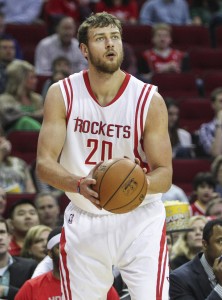
Courtesy of USA Today Sports Images
The Rockets made a somewhat unexpected postseason run to the Western Conference Finals without Patrick Beverley and Donatas Motiejunas, both of whom sat out the postseason with injury. Houston nonetheless re-signed Beverley, though he came back at a relative bargain of a deal worth four years and $23MM, and the Rockets brought in Ty Lawson, who’ll challenge him for the starting point guard position. Motiejunas already has plenty of competition at power forward in Houston, but it remains to be seen whether he, like Beverley, is prepared to do a post-injury deal with the Rockets and risk signing at an ebb tide in his leverage.
The Wasserman Media Group client has the luxury of waiting until next summer, unlike Beverley, whose contract expired at season’s end. Yet a deal during this offseason would give Motiejunas greater stability, since the Poison Pill Provision makes it difficult for teams to trade players between the time they sign rookie scale extensions and the time those extensions kick in the following July. It would also allow him to capitalize on a 2014/15 regular season in which he made 62 starts, nearly four times as many as the total number of starts he made in his first two years in the league. He played a critical role for a Rockets team that managed to overcome injuries to Dwight Howard and others and finish with the second-best record in the West before the 24-year-old Lithuanian suffered his own injury, a back ailment that required surgery.
Motiejunas averaged 12.0 points in 28.7 minutes per game this past season, with that offense coming in the quintessential Rockets way. He took less than 10% of his shots from distances that were more than 10 feet away from the basket but within the three-point line, as Basketball-Reference shows. Most of his looks were within 10 feet, as he gave Houston an interior presence, but when he ventured outside to shoot his three-pointers, he made 36.8% of them, a significant improvement on a career three-point percentage that had been 26.9% going into last season. The question of whether his strong shooting season is an outlier or a true indication of his improvement will no doubt hang over negotiations.
The 7-footer’s rebounding numbers are discouraging, as he collected only 5.9 boards per game. Some of that probably has to do with the presence of Howard, but D12 only played in 41 games and posted his lowest RPG since his rookie season. Motiejunas meanwhile rebounded less frequently per 36 minutes this past season than he did in 2013/14.
Defensively, his numbers are mixed. He was a plus on that side of the court, according to Basketball-Reference’s Defensive Box Plus Minus, and the same is true in ESPN’s Defensive Real Plus Minus, though he ranked as just the 29th-best power forward in that category this past season. The Rockets gave up 1.1 more points per 100 possessions when Motiejunas was on the floor compared to when he wasn’t, according to NBA.com, though that’s a stat that doesn’t separate him from what the other four players on the floor were doing. Still, it’s not encouraging for his case that the Rockets were a net 2.3 points per 100 possessions better overall with Motiejunas sitting.
Motiejunas was more efficient last year than he’d been in the past, as his career-best 14.4 PER indicates, but that’s still below 15.0, the mark of an average player in that category. That pales in comparison to the 18.3 PER of Terrence Jones, the other Rockets power forward up for a rookie scale extension. The relative value of Jones versus Motiejunas will color the negotiations for both. Jones missed significant time with an injury last season, too, and their numbers weren’t all that dissimilar. Still, areas of separation, such as the PER number, will loom large.
The Rockets will have about $44.5MM committed for 2016/17, assuming they pick up Clint Capela‘s rookie scale team option. That doesn’t include any money for Howard, who has a player option worth nearly $23.3MM, or Lawson, whose more than $13.2MM salary is non-guaranteed. Bring them both back, and Houston would have at least $81MM against a projected $89MM cap, and perhaps more if Howard opts out and re-signs at a higher number. An extension for either Motiejunas or Jones would make it more difficult for Houston to replace Howard if he bolts and perhaps even put the team in danger of crossing the projected $108MM tax line if Howard and Lawson remain.
Motiejunas is more power forward than center, but the $64MM over four years that Jonas Valanciunas is receiving in his extension from the Raptors is a factor. The rises in the salary cap that will come in the next few years are already having a profound effect on the economics of player salaries, and even if Motiejunas can’t quite command what his fellow Lithuanian got, it’s fair to suggest an extension would entail salaries of around $12-14MM a year.
It’s difficult to envision Rockets GM Daryl Morey, who values flexibility, committing to a number like that. Houston will have a tough time clearing cap space next summer anyway, but Morey has proven adept at that. The extension would also compromise Morey’s flexibility for trades this season, given the Poison Pill Provision. Morey and company will probably have discussions with the Motiejunas camp and make at least a token offer, but I doubt that reaching a deal will be a priority. Motiejunas has incentive to make the Rockets think twice about such a stance, given his strong season, but he’d probably have to take less than he could command on the open market to get Morey to budge, and little reason exists for him to take a discount if he’s looking to capitalize on his performance.
Should the Rockets sign Motiejunas to an extension? Leave a comment to give us your thoughts.
